Capillary filtration Study guides, Class notes & Summaries
Looking for the best study guides, study notes and summaries about Capillary filtration? On this page you'll find 2337 study documents about Capillary filtration.
Page 4 out of 2.337 results
Sort by
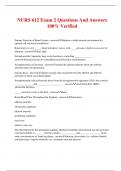
-
NURS 612 Exam 2 Questions And Answers 100% Verified
- Exam (elaborations) • 24 pages • 2024
- Available in package deal
-
- $13.49
- + learn more
NURS 612 Exam 2 Questions And Answers 100% Verified Primary Function of Renal System - answerMaintain a stable internal environment for optimal cell and tissue metabolism Renal artery is very _____, blood in kidney's moves with ____ pressure, which is necessary for filtration - answershort; high Juxtaglomerular Apparatus large scale function is controlling _____ ________ - answerblood pressure (by controlling renal blood flow and filtration) Juxtaglomerular cell location - answeraround ...
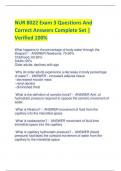
-
NUR 8022 Exam 3 Questions And Correct Answers Complete Set | Verified 100%
- Exam (elaborations) • 21 pages • 2024
-
- $13.49
- + learn more
NUR 8022 Exam 3 Questions And Correct Answers Complete Set | Verified 100% What happens to the percentage of body water through the lifespan? - ANSWER Newborns; 75-90% Childhood; 60-65% Adults; 60% Older adults; declines with age Why do older adults experience a decrease in body percentage of water? - ANSWER - increased adipose tissue - decreased muscle mass - renal decline - diminished thirst What is the definition of osmotic force? - ANSWER Amt. of hydrostatic pressure requi...

-
Human Physiology: An Integrated Approach, 6e (Silverthorn) Chapter 19 Exam - The Kidneys || Questions & Answers (100% Verified)
- Exam (elaborations) • 18 pages • 2024
-
- $11.49
- + learn more
Human Physiology: An Integrated Approach, 6e (Silverthorn) Chapter 19 Exam - The Kidneys || Questions & Answers (100% Verified) Human Physiology: An Integrated Approach, 6e (Silverthorn) Chapter 19 Exam - The Kidneys || Questions & Answers (100% Verified) 21) In normal kidneys, blood cells and plasma proteins are A) filtered then reabsorbed. B) secreted then reabsorbed. C) not filtered. D) filtered and secreted. - ANSWER - : C Section Title: Filtration Learning Outcome: 19.3 : Leve...
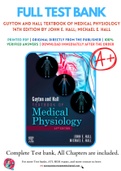
-
Test Bank for Guyton and Hall Textbook of Medical Physiology 14th Edition By John E. Hall; Michael E. Hall Chapter 1- 85 Complete Guide A+
- Exam (elaborations) • 266 pages • 2022
-
- $25.05
- 2x sold
- + learn more
Test Bank for Guyton and Hall Textbook of Medical Physiology 14th Edition By John E. Hall; Michael E. Hall Chapter 1- 85 Complete Guide A+ 7128, 2 1. Functional Organization of the Human Body and Control of the “Internal Environment” 2. The Cell and Its Functions 3. Genetic Control of Protein Synthesis, Cell Function, and Cell Reproduction 4. Transport of Substances Through Cell Membranes 5. Membrane Potentials and Action Potentials 6. Contraction of Skeletal Muscle 7...
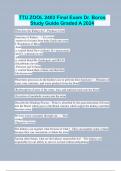
-
TTU ZOOL 2403 Final Exam Dr. Boros Study Guide Graded A 2024
- Exam (elaborations) • 29 pages • 2024
-
Available in package deal
-
- $14.49
- + learn more
What does the Kidney do? - Produces Urine Functions of Kidney - 1. Excretion -removal of wastes from body fluids into urine 2. Regulation of Blood -Ions a. control blood Na+ (sodium), K+ (potassium), and Cl- (chloride) levels -ph a. control blood H+ (hydrogen) and HCO3- (bicarbonate) levels -Pressure and Volume a. control blood fluid volume and therefore blood pressure What three processes do the Kidneys use to perform their functions? - -Filtration of water, ions, ...
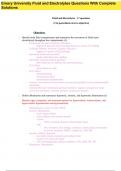
-
Emory University NRSG 533 Exam 1 Blueprint Adult and Gero QUESTIONS AND ANSWERS
- Exam (elaborations) • 18 pages • 2023
-
Available in package deal
-
- $15.99
- + learn more
Fluid and Electrolytes - 17 questions (# in parenthesis next to objective) Objectives: 1. Identify body fluid compartments and summarize the movement of fluids (and electrolytes) throughout the compartments (1) - Hydrostatic Pressure (Capillary Filtration) - highest at arterial end (30 mmHg), lowest at venous (10 mmHg) - Colloidal Osmotic Pressure (Capillary Oncotic) - highest at venous end (28 mmHg) - Interstitial hydrostatic pressure - pushes fluid back into capillary - Interstitial...
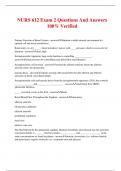
-
NURS 612 Exam 2 Questions And Answers 100% Verified
- Exam (elaborations) • 24 pages • 2024
- Available in package deal
-
- $13.49
- + learn more
NURS 612 Exam 2 Questions And Answers 100% Verified Primary Function of Renal System - answerMaintain a stable internal environment for optimal cell and tissue metabolism Renal artery is very _____, blood in kidney's moves with ____ pressure, which is necessary for filtration - answershort; high Juxtaglomerular Apparatus large scale function is controlling _____ ________ - answerblood pressure (by controlling renal blood flow and filtration) Juxtaglomerular cell location - answeraround ...
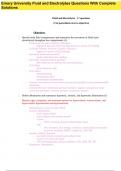
-
Emory University NRSG 533 Exam 1 Blueprint Adult and Gero QUESTIONS AND ANSWERS
- Exam (elaborations) • 18 pages • 2023
-
Available in package deal
-
- $15.99
- + learn more
Fluid and Electrolytes - 17 questions (# in parenthesis next to objective) Objectives: 1. Identify body fluid compartments and summarize the movement of fluids (and electrolytes) throughout the compartments (1) - Hydrostatic Pressure (Capillary Filtration) - highest at arterial end (30 mmHg), lowest at venous (10 mmHg) - Colloidal Osmotic Pressure (Capillary Oncotic) - highest at venous end (28 mmHg) - Interstitial hydrostatic pressure - pushes fluid back into capillary - Interstitial...
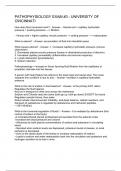
-
Pathophysiology Exam #3 - University of Cincinnati
- Exam (elaborations) • 36 pages • 2023
-
- $12.49
- + learn more
How does fluid movement work? - Answer- - Arterial end = capillary hydrostatic pressure = pushing pressure ---> filtration - Venous end = higher capillary oncotic pressure --> pulling pressure ---> reabsorption What is edema? - Answer- accumulation of fluid into interstitial space What causes edema? - Answer- 1. increased capillary hydrostatic pressure (venous obstruction) 2. Decreased plasma oncotic pressure (losses or diminished production of albumin) 3. Increased capill...
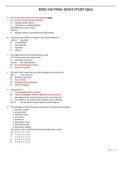
-
BIOS 256 FINAL EXAM STUDY Q&A | Comprehensive ATI
- Exam (elaborations) • 20 pages • 2022
-
- $13.48
- 1x sold
- + learn more
BIOS 256 FINAL EXAM STUDY Q&A 1 The urinary system does all of the following, EXCEPT it A secretes excess glucose molecules B regulates blood volume C contributes to stabilizing blood pH D eliminates organic waste products E regulates plasma concentrations of electrolytes 2 Conical structures that are located in the renal medulla are called A pyramids B renal columns C renal pelvises D nephrons E calyces 3 The region known as the macula densa is part of A the proximal convoluted tubule B the dis...

Do you wonder why so many students wear nice clothes, have money to spare and enjoy tons of free time? Well, they sell on Stuvia! Imagine your study notes being downloaded a dozen times for $15 each. Every. Single. Day. Discover all about earning on Stuvia


